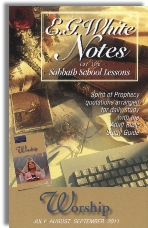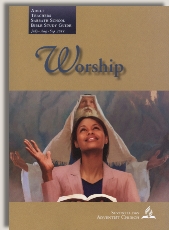|
||||||||||||||
Commentary on "Worship: From Exile to Restoration"
Day 1: Sabbath Afternoon, August 27, 2011 - Introduction
Review
This week’s Lesson looks at Israel’s worship practices around the time of the Babylonian exile and Israel’s temptations to conform to worldly customs. Israel was carried off to Babylon because they had compromised with the world and failed God in their worship practices. His purpose in giving them back their nation and reviving true worship in Israel was to allow them yet another opportunity, as the Lesson states:
“And yet, amid all the devastation, the Lord promised that the nation would be restored, the temple rebuilt, and Israel given another chance to fulfill her prophetic destiny.”
If we keep our worship practices undefiled by the world through vigilance, repentance, and obedience to God’s commandments, the Lesson tells us, God can fulfill His promises to us, and we will also be given a chance to fulfill our prophetic destiny.
Observations
Haggai’s message is a good illustration of a call to worship. The prophet prodded apathetic Israel with the message that they had their priorities upside down. While living in paneled house and getting comfortable, they let God’s temple remain in ruins. They had slipped into a “health and wealth” gospel, putting physical well-being and comforts above God’s glory. Haggai compared this to “filling a bag with holes,” so that they could not feel any satisfaction in life. Their health, wealth, and spirituality were all vanity, a sowing of the wind.
God’s passion is for His glory, and worship is the receiving of that passion into our hearts so that all of life becomes worship. This week we will contrast physical worship, a worship tied to places, buildings, and certain behaviors, to worship under the New Covenant. This is a radically spiritual worship (Rom. 12:1) where all our motivations are driven “by the mercies of God.” The Lesson talks about keeping our worship pure from worldly influences and customs. Often, Christians debate about having “worldly” practices in church such as certain kinds of music or rituals. However, true worship is not some carefully balanced “middle way” between local customs and pure church traditions. Nor does pure worship have anything to do with keeping a healthy body. It is about delighting in God above all else, and by His mercy, building the body of Christ through our acts of mercy.
The Lesson also brings in the concept of “prophetic destiny.” What does that mean? Israel’s entire history has been haunted by prophecies, beginning with God’s first conversation with Abraham, and reaching its end at the New Jerusalem. Through Abraham’s Seed, all the families of the earth would be blessed, and that was not a conditional promise. This was truly “destiny,” a sure word of prophecy. Destiny refers to a “predetermined course of events” (merriam-webster.com), not to something that is subject to chance. It is contradictory to say that after the captivity, Israel was “given another chance to fulfill her prophetic destiny.” Jesus the Messiah was prophesied to come to Israel and reign on the throne of David, for He was their destiny. As the One who declares things from the beginning (Is. 41:26), the words of His scripture “must be fulfilled.” So even though Israel failed, God’s word did not (Rom. 9:6). The purpose of history is God’s glory and honor, not ours.
Israel did not have an honorable, triumphant history, for after they rejected their Messiah they were destroyed and scattered. So how were they a “movement of destiny?” God’s declarations for the future do not fall to the powers of “chance” and the weakness of the human will. Their destiny was wrapped up in the Messiah and His destiny, and He could not fail. In fact, Paul shows us that Israel’s failure was woven in to God’s plans to bless the world:
“For just as you were at one time disobedient to God but now have received mercy because of their disobedience, so they too have now been disobedient in order that by the mercy shown to you they also may now receive mercy.” Romans 11:30, 31
The coming of Jesus the Messiah to offer salvation to the Remnant people, both Jews and Gentiles, was a predetermined course of events, not subject to chance. That is something to cherish and celebrate anywhere, anytime with all our hearts and minds. Jesus cannot fail; He is the same, today, yesterday, and forever! “Oh, the depth of the riches and wisdom and knowledge of God!” Romans 11:33
Summary
- Israel’s health and wealth gospel was an upside down gospel, an exercise in futility that denied God’s glory.
- God’s passion is for His glory, and worship becomes possible when we receive that passion into our hearts, making all of life worship.
- Worship is not about balancing the world and a set of “pure” traditions, but about making God our delight and sharing our joy with acts of mercy.
- The coming of Jesus the Messiah to save the world was Israel’s destiny, predetermined by God. Their failures were not a failure of God’s word.
- The disobedience of Israel was part of God’s plan to bring mercy and blessings to the entire world.
Copyright 2011 BibleStudiesForAdventists.com. All rights reserved. Revised August 27, 2011. This website is published by Life Assurance Ministries, Glendale, Arizona, USA, the publisher of Proclamation! Magazine. Contact email: BibleStudiesForAdventists@gmail.com.
The Sabbath School Bible Study Guide and the corresponding E.G. White Notes are published by Pacific Press Publishing Association, which is owned and operated by the Seventh-day Adventist church. The current quarter's editions are pictured above.
Official Adventist Resources
Standard Edition Study Guide Week 10
Teacher's Edition Study Guide Week 10
Easy Reading Edition Study Guide Wk 10
Search the Complete Published Ellen G. White Writings
Please Support This Project


